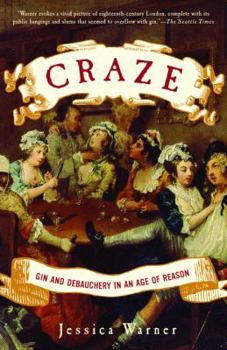Craze: Gin and Debauchery in an Age of Reason
Select Format
Select Condition 
Book Overview
In 1720, a new drink emerged as the overwhelming drug of choice among London's working poor; it was both affordable and many times stronger than traditional spirits. The beverage was gin, and the... This description may be from another edition of this product.
Format:Paperback
Language:English
ISBN:0812968999
ISBN13:9780812968996
Release Date:October 2003
Publisher:Random House Trade
Length:267 Pages
Weight:0.50 lbs.
Dimensions:0.6" x 5.2" x 8.1"
Customer Reviews
5 ratings
Good assessment of social effects, bad conclusions
Published by Thriftbooks.com User , 18 years ago
While reading most of this book, I felt it was a good analysis of the impact of gin on this culture. However, I believe the conclusions in the last 20 pages are wildly simplistic and badly supported.
An illuminating history of the first political drug war
Published by Thriftbooks.com User , 20 years ago
Warner's book is a fascinating study of how politics, drugs and society intertwined in 18th century England to create the first known "drug menace." Written in a casual, conversational style, "Craze" describes the fifty-year-long, escalating relationship between the introduction of gin in 1720, the deleterious effects upon the people who abused it, and the politicians who then demonized it. Each successive "gin law" ensured that some would profit from the taxation and regulation of Mother Geneva, while at the same time gaining political capital from the prosecution of demon alcohol. Warner also describes the parallels between past and present, especially those presented as "victims" of drug wars -- the unwed mother, the unemployable addict -- whose problems lay far outside the realm of the political or the ability to be helped by these laws. An essential book to the understanding of how drugs affect the individual and society at large.
Well-researched, and with a good writing style
Published by Thriftbooks.com User , 21 years ago
Warner has a good, punchy writing style, and she's clearly done her homework. The story is meticulously well-researched and she knows her history. The parallels with more modern drug scares are illuminating.
A War On Drugs, in Eighteenth Century London
Published by Thriftbooks.com User , 21 years ago
Every physician knows that there is an abusable and addictive drug that produces more physical deterioration, complications with medication, and disruption of happiness than any other. The drug is alcohol, and although it has been around for millennia, it was available in eighteenth century London in a new way. A history of the "Gin Craze" might seem to be an unlikely topic to produce a learned and funny book, but _Craze: Gin and Debauchery in the Age of Reason_ (Four Walls Eight Windows), by Jessica Warner, not only is full of surprising facts and statistics (peak gin use was in 1743, 2.2 gallons of gin per person, per year), but it brings a light to a murky little corner of human history that may be reflected usefully into our own times.Clearly, the ruling classes of Britain realized that gin was a social evil. Of course, it was a social evil for the ruled classes, for gin became a craze among the poor of the city. Such reformers as members of the Society for Promoting Christian Knowledge could not fathom why gin had any appeal. Reform had to conquer inertia. The landed gentry were only too happy to have distillers as eager buyers for their surplus grain. The London Company of Distillers had friends in Parliament and was willing to keep them friendly by dishing out money. The government was glad to get excise taxes and license fees from the sales of gin. Over a 22 year period, reformers persuaded Parliament to pass eight different laws, generally ineffective, to suppress the consumption of gin. Monetary rewards were given to informers who squealed for a fee. Informers were not popular. Some were beaten to death by angry mobs, who resented that members of their own circle betrayed them. The reformers failed, because they had it backward; Warner writes, "It was not gin that made people poor. It was poverty that made them drink."As the book draws to a conclusion, the reader is likely to have reflected many times during it that it is not really about gin. Warner calls her fascinating distillation of court reports, newspaper articles, and contemporary statistical tables "a parable about drugs, about why some people take them and other people worry when they do." Gin was merely the first urban drug, cheap, available, and able to neutralize the misery of poverty, at least temporarily. It made cities frightening to the upper and middle classes that did not live in them. Reformers exaggerated the tales of just how bad gin was, and pamphleteers were ready to spread the exaggerations. In her final chapter, she makes the breadth of her parable plain. We are "too easily seduced by the notion that the complex problems that come with complex places boil down to a simple and single source, be it gin, heroin or crack cocaine." Declaring a War on Drugs is facile and futile. No war on poverty has yet been universally successful, but unless something is done to relieve the poverty that makes drugs seem attractive, warring on drugs is just window dressing.
A thought-provoking analysis and a lively history
Published by Thriftbooks.com User , 22 years ago
Meticulously researched and deftly written by Jessica Warner, Craze is an informed and informative social history into the mania for gin which overtook London during the early 18th century probes why the society of the times become involved in gin as a drug, and how the working poor became addicted to it. The passion for alcohol and its role in supporting a rickety English social system makes for a thought-provoking analysis and a lively history.





